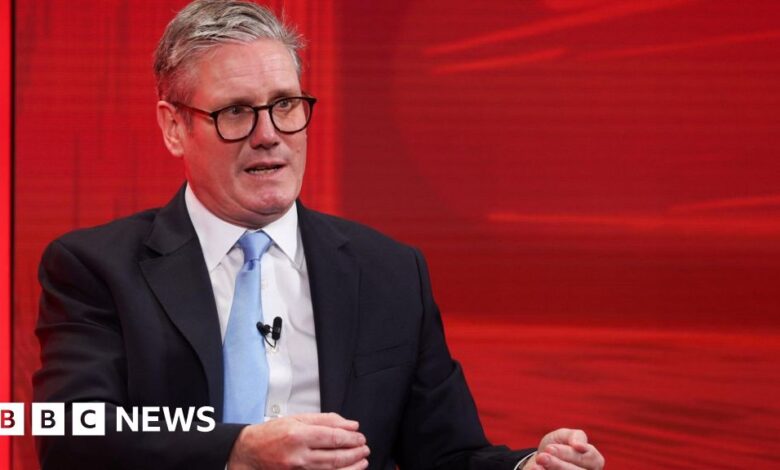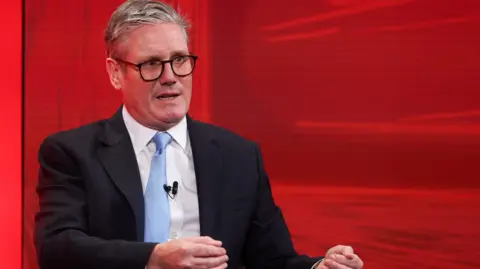Keir Starmer defends changes to workers’ rights as ‘pro-growth’

 EPA
EPASir Keir Starmer has defended the government’s plans to overhaul and increase workers’ rights as “pro-growth”.
The prime minister also told a major business summit in the UK he would scrap regulation that “holds back investment” and would ask regulators to prioritise growth.
The government’s Employment Rights Bill proposes a number of changes including to sick pay and parental leave, but some business groups are concerned about how they would work in practice and there are fears some may put off hiring new staff.
While the government is seeking to support business, citing growing the economy as its top priority, it is also aiming to strike a balance by being pro-worker as well.
Speaking to business leaders at the international summit in London, Sir Keir said greater security for workers would lead to better growth in the economy.
The proposals would see people being able to get sick pay from the first day they are ill and claim unpaid parental leave as soon as they start a job, although most of the planned changes will not take effect for two years.
Stansted expansion
At the summit, the prime minister announced £1.1bn worth of investment in Stansted Airport by its owner Manchester Airports Group.
The funding will expand the airport’s terminal by a third and is expected to create more than 5,000 jobs.
Sir Keir also said he wanted to “rip out” bureaucracy obstructing investment.
He said it was time to “upgrade the regulatory regime”, and pledged to “make sure that every regulator in this country – especially our economic and competition regulators – take growth as seriously as this room does”.
Eric Schmidt, the former chief executive of internet giant Google, told Sir Keir at the event that delays to regulation were “killing you”.
“I think the business community would much rather have a single person who can say yes or no… and then they can move on,” he said.
“The cost of capital and the delay is killing you, and furthermore you’re not going to achieve your 2030 energy goal, which is laudable, without fixing this.”
The boss of US pharmaceutical giant Eli Lilly, David Ricks, who also attended the event, told the BBC that the UK had to take a new approach now that it was no longer part of the EU.
“I think the difference in the UK is, separate from Europe, it’s a relatively small market for most multinationals and certainly for Americans, so something needs to be quite different to make it interesting,” he said.
Speaking to the Today programme, Technology Secretary Peter Kyle said “you don’t have to cut corners” on regulation to “get innovation through”.
Asked if the UK would regulate less than the EU to attract businesses, he said: “I would say you need to regulate smartly and you need to regulate creatively.”
The boss of the Norwegian energy company Equinor, Anders Opedal, told the BBC that stability was key, especially regarding tax, and the Budget later this month “will be very important for us”.
“I think the government are putting forward a very good strategy for how to improve, working together with the private sector, now it is about execution and getting execution right.”
The government is facing a balancing act ahead of the Budget, having already signalled that some taxes will rise.
On Sunday, Business Secretary Jonathan Reynolds did not rule out an increase in the rate of National Insurance paid by employers.
Labour pledged in its manifesto not to raise National Insurance. But Reynolds told Sky News: “That pledge – it was taxes on working people so it was specifically in the manifesto, a reference to employees and to income tax.”
Musk row
Earlier this month it emerged that the world’s richest person, Elon Musk, had not been invited to the investment summit.
But the technology secretary said the billionaire would have been “very, very welcome if he had an open investment programme that we could have latched on to”.
“We would love to engage with Elon Musk,” Kyle said.
“If he opens up an investment programme and there is global competition for it, believe me we will be first in line.”
Ahead of the summit, some of the world’s biggest companies wrote to the Times saying greater stability had increased the UK’s attractiveness.
The letter to the Times, signed by major banks such as Goldman Sachs and JP Morgan, said there was a “very real opportunity for the UK to grow its economy by attracting international investment”.
DP World confirmed that a £1bn investment in the London Gateway port would go ahead, adding it would create 400 new jobs and make it the UK’s largest container port within five years.
The commitment had looked to be in jeopardy after Transport Secretary Louise Haigh called on people to “boycott” DP World’s subsidiary P&O Ferries over their past treatment of staff.
Haigh was publicly rebuked by the prime minister, and DP World attended the conference, along with the bosses of investment giants such as Blackrock and L&G.
Australian firm Macquarie, which has been blamed for saddling Thames Water with unsustainable debts when it was its biggest shareholder, is promising to invest £20bn in the UK over the next five years, including an electric car charging network.
The conference is taking place at London’s Guildhall, and will feature a keynote speech from Chancellor Rachel Reeves later.




